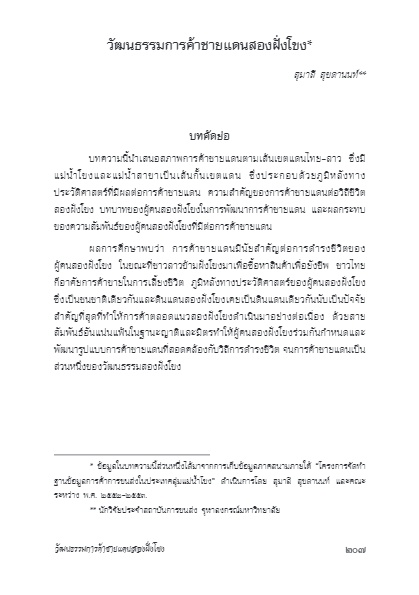สุมาลี สุขดานนท์
บทคัดย่อ
บทความนี้นำเสนอสภาพการค้าชายแดนตามเส้นเขตแดนไทย–ลาว ซึ่งมีแม่น้ำโขงและแม่น้ำสาขาเป็นเส้นกั้นเขตแดน ซึ่งประกอบด้วยภูมิหลังทางประวัติศาสตร์ที่มีผลต่อการค้าชายแดน ความสำคัญของการค้าชายแดนต่อวิถีชีวิตสองฝั่งโขง บทบาทของผู้คนสองฝั่งโขงในการพัฒนาการค้าชายแดน และผลกระทบของความสัมพันธ์ของผู้คนสองฝั่งโขงที่มีต่อการค้าชายแดน
ผลการศึกษาพบว่า การค้าชายแดนมีนัยสำคัญต่อการดำรงชีวิตของผู้คนสองฝั่งโขง ในขณะที่ชาวลาวข้ามฝั่งโขงมาเพื่อซื้อหาสินค้าเพื่อยังชีพ ชาวไทยก็อาศัยการค้าขายในการเลี้ยงชีวิต ภูมิหลังทางประวัติศาสตร์ของผู้คนสองฝั่งโขง ซึ่งเป็นชนชาติเดียวกันและดินแดนสองฝั่งโขงเคยเป็นดินแดนเดียวกัน นับเป็นปัจจัยสำคัญที่สุดที่ทำให้การค้าตลอดแนวสองฝั่งโขงดำเนินมาอย่างต่อเนื่อง ด้วยสายสัมพันธ์อันแน่นแฟ้นในฐานะญาติและมิตรทำให้ผู้คนสองฝั่งโขงร่วมกันกำหนดและพัฒนารูปแบบการค้าชายแดนที่สอดคล้องกับวิถีการดำรงชีวิต จนการค้าชายแดนเป็นส่วนหนึ่งของวัฒนธรรมสองฝั่งโขง
(ตีพิมพ์ใน วารสารไทยศึกษา ปีที่ 8 ฉบับที่ 2 (สิงหาคม 2555 – มกราคม 2556) หน้า 207-227)
Culture in Cross–border Trade along the Banks of the Mekong River
Sumalee Sukdanont
Abstract
This paper explores cross–border trade along the Thai–Laos border which is demarcated by the Mekong River and her tributaries. The paper covers the influence of the historical background of cross–border trade along the Mekong River; the significant of border trade to the lives of the people on the banks of the river; the role of the people along the banks of the river in the development of trade; and how the relationship of the people affects cross–border trade.
Cross–border trade plays a crucial role in the lives of the people along the banks of the river. The Lao depend mostly on Thai consumer products to sustain their lives and the Thai depend on border trading to make their living. The historical background of the same race and the same nation is the most important contribution to the existing of cross–border trade along the Mekong River. The close relationship of the people as friends and relatives creates a collaboration of the people in setting up and developing the trade pattern which is consistent with their way of life. As a result, cross–border trade has become part of the culture of the people living on the banks of the Mekong River.
(Published in Journal of Thai Studies Volume 8 Number 2 (August 2012 – January 2013) Page 207-227)
บทความ / Full Text : Download
